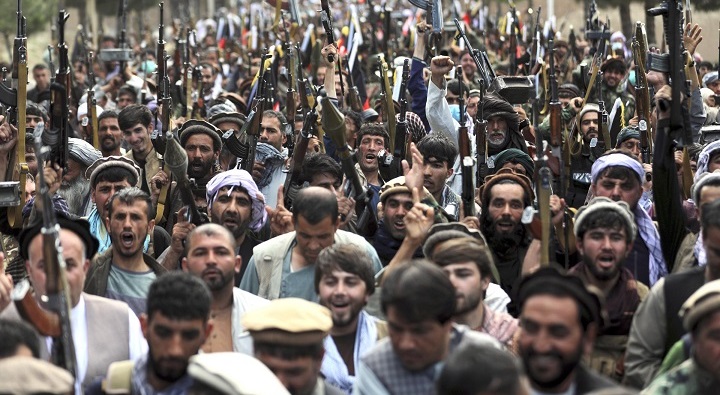
On August 24, 2001, a little over two weeks before the 9/11 attack, some were already aware that Afghanistan was a geopolitical black hole in the Eurasian continent and that a terrorist attack could arrive from there or the Sahara Desert, maybe using one of the warheads from the former USSR.
“For the first time in a thousand years, the western tip of Europe is falling together under a united economic order which is now believed to be stronger than political agreements and should or could lead to a political union. On the other end of the continent, some vibrant economies, with China actually the most interesting, are taking center stage in world trade. The middle is not so rosy. In the east, from Pakistan to Lebanon, we have economically weak or/and politically weak states that cause instability for all their neighbors.
The picture doesn’t change much moving north around the Caspian Sea, and it possibly gets worse as waves of instability pulse from the black hole of Afghanistan, an entity that doesn’t want to trade with most of the world and with which most of the world doesn’t feel like trading. Then, up in the north, there is Russia. Now, despite all its present economic and political woes, Russia is an anchor of stability in the Central Asian context.”[1]
Now Afghanistan can’t be a geopolitical black hole anymore. It has to learn to deal with different neighboring realities or be under siege in war, and it won’t be easily forgotten anymore.
The reasons for this came from those articles twenty years ago. They are, in a nutshell, that geopolitical priorities have changed. Then the EU was expanding eastward and integrating former Soviet satellites. China was a minor power, with a puny economy, just over half of Italy at the time. Pakistan, India, and the rest of Asia were struggling, and Japan felt still battered after losing the 1980s technological race with the US, the absolute superpower.
Then nobody cared about Afghanistan and its wannabe terrorists or weird warnings from Beijing.
Presently the situation is different. Douglas London was CIA’s counterterrorism chief for south and southwest Asia before his 2019 retirement; he was responsible for assessments concerning Afghanistan prepared for former president Donald Trump. And as a volunteer with candidate Joe Biden’s counterterrorism working group, he consulted on these same issues. He forcefully stated that:
“The US Intelligence Community assessed Afghanistan’s fortunes according to various scenarios and conditions and depending on the multiple policy alternatives from which the president could choose. So, was it 30 days from withdrawal to collapse? 60? 18 months? It was all of the above, the projections aligning with the various ‘what ifs.’ Ultimately, it was assessed, Afghan forces might capitulate within days under the circumstances we witnessed, in projections highlighted to Trump officials and future Biden officials alike.”[2]
London explains that the decision to go ahead with the withdrawal despite the warnings came down to wanting to “end the endless war.” But other strategic concerns probably contributed to this momentous decision also. It is essential to reset America’s priorities. Now there is China, which is far more important than Afghanistan.
Comparisons with Vietnam and its dramatic withdrawal in 1975 are perhaps flawed. Then it was to cut losses, regroup, and rethink. The US had an ace in the hole, a new agreement with China. Gaining China, although losing Vietnam, was a good bargain, after all. But in 1975, America still had no grand strategy, no clear picture of “what next” in the Cold War with the USSR.
The withdrawal from Vietnam was to stop the bleeding of a war that had become highly controversial domestically. Soldiers fighting there were drafted, often not eager to go. In Afghanistan, they were volunteers. In 1975 the withdrawal was about plugging the flow of disaffected veterans and trying to delay and eventually block the revolution brewing at home.
Now there is a clearer external picture: take on China. It is still not well defined how and what the end game is regarding China and the rest of the world. China is too important, and thus it entails a new world order. But something is there that wasn’t in 1975.
This is not to take away from what is happening in Afghanistan, where the Taliban are taking control with horrible consequences. It’s terrible, and it’s ugly. But there’s a bigger picture to look at.
In the year 2000, Al Qaeda was a terrorist organization independent from any state and had been a plague for over a decade without anybody paying significant attention. They “appropriated” support from the Saudis and the Pakistanis, but no state as such knowingly fully backed them. This time all states are aware and present. If terrorism comes out of Afghanistan, one or more governments could be held responsible, and these people could pay the consequences.
Now it is more challenging to be a geopolitical black hole. It has to learn to deal with different neighboring realities or be under siege in war. But it won’t be too easily forgotten anymore. Neither will the new Taliban government have an easy time supporting itself. The Americans bought the whole country with a few million dollars. It was enough because they were all destitute.
Now with a trillion dollars flowing in over twenty years, every expectation about life is blown out of proportion. Living without this massive flow of money won’t be easy, and it could impose significant changes for everybody. But it is hard to imagine that the Taliban will gladly and readily go back to their mountain hovels. Then, there are external and internal pressures against turning Afghanistan back into a black hole.
Logistic challenges
Moreover, the situation in Afghanistan is complicated for logistical reasons. The only land route to Afghanistan is through Pakistan, but Pakistan has no significant interest in opposing the Taliban frontally. Pakistan relies heavily on its agitation of Indian Kashmir, and the claim to Kashmir is for Pakistan an existential element of its political survival. One aspect of the Kashmir issue is to help and support radical Islamists who think that Pakistan and the cause of an Islamic Republic are the same.
The same people who fight for Kashmir against India are the ones who also support and oppose the Taliban. Therefore, if Pakistan suppresses the Taliban, even if it had the will and the strength to do so, it would also curtail its strength to claim Kashmir, and without Kashmir, there is no ideal Pakistan. This is controlled by Pakistani intelligence, the ISI, a state within a state, which is also in charge of the delicate national nuclear arsenal. The safety of this arsenal is essential for the US, possibly more than the fate of Afghanistan. China’s paramount expert on Islamic affairs, professor Zhang Xiaodong from CASS (Chinese Academy of Social Sciences), explained this to me over 20 years ago. Thus, this was very clear to the Chinese government.
The United States had different assets to support its presence in Pakistan during the Cold War. Pakistan was firmly aligned with the US against the USSR. Even when Pakistan didn’t quite play ball with the United States, since the 1980s, the United States started a secondary but critical supply channel and connection with the Mujahedin, fighting the Soviets through China.
Then, the two channels through Pakistan and China could compete with each other and create greater logistical efficiency. It is important to remember that until 1979, Iran, which borders Afghanistan, was firmly on the US side. Since then, it stopped being an ally of the US and had a growing anti-America position, while being a route for exchanges to Central Asia.
Then we are back to 2002, with the American intervention in Afghanistan. At the time, it had a flimsy connection with China, which was not too eager to reopen logistical routes to help the fight against the Taliban. This reluctance fell further over the years as the American global initiatives met growing difficulties in Iraq, Afghanistan, and with the Jasmine revolutions.
In all of this, Iran could not help: It was out of the question because Iran was a sworn enemy of the US. Pakistan was the only available channel. But it proved less efficient than two decades before. It had no competition to spur its activities. Also, Pakistan grew disaffected with the US, as the US was improving its relations with neighboring India and bequeathed Afghanistan a pro-Indian faction.
Therefore, Pakistan had no huge reason to play ball with the US. In this situation, America was cut off from any solid, land-based logistic supply route, and it was held at least partly hostage of a country, Pakistan, with good ties with China, the focus of the new Cold War.
Afghanistan is undoubtedly a defeat, a significant setback. But this started in 2002 when the US went into Afghanistan without a clear idea of what to do and when and how to exit. This will also impact allies, wondering what long-term American plans for China and the world are and what could be considered a “victory” regarding China. But it is also evident that the US is cutting its Afghanistan presence to boost its commitment to Japan and Taiwan in East Asia.
On the other hand, this withdrawal could help rebuild ties between America and ISI on different grounds. India also, no longer distracted by the vagaries of Kabul, may receive some “compensation” from the US, namely more significant support for its anti-China drives. This could mean more pressure on China from the Indian front.
There are many political questions now. The support of the many allies committed in Central Asia can’t be switched on and off like a lightbulb. This support has to be built rapidly, and it could prove not so easy after looking at the images from Kabul. This will give China some time, but it should also give it pause about American determination, since the US was willing to face a grave challenge over this withdrawal.
The Economist eloquently described Western concerns over what was happening in Kabul in the middle of August.
“When it became clear that the Afghan army was melting away, Mr. Biden pressed on intransigently, despite the likely consequences. As a result, America’s power to deter its enemies and reassure its friends has diminished. Its intelligence was flawed, its planning rigid, its leaders capricious, and its concern for allies minimal. That is likely to embolden jihadists everywhere, who will take the Taliban’s victory as evidence that God is on their side. It will also encourage adventurism on the part of hostile governments such as Russia’s or China’s, and worry America’s friends. Mr. Biden has defended the withdrawal by arguing that Afghanistan was a distraction from more pressing problems, such as America’s rivalry with China. But by leaving Afghanistan in such a chaotic fashion, Mr. Biden will have made those other problems harder to deal with.”[3]
The analysis is correct. If there are no values to guide policies but only cold realism, authoritarian regimes have already won because the conversation has moved to their ground – a few people who have the wisdom and thus the right to decide what is good for the state, regardless of the people’s sentiment. The furor of the Western press over this confused withdrawal proves that the soul of the West may be stronger than the decisions of an administration. This soul can bend a Western administration, and this can change the outcome.
However, in the West, realism must temper values; otherwise, this all becomes stupidity. This is the difficult balancing act of the US, now dealing with President Joseph Biden’s hard decision to pull out.
[1] Francesco Sisci, “Non-aligned Russia a vital buffer in Asia,” August 24, 2001, and “Expanded Atlantic alliance raises Asia dilemma,” August 28, 2001, Asia Times.
[2] https://www.justsecurity.org/77801/cias-former-counterterrorism-chief-for-the-region-afghanistan-not-an-intelligence-failure-something-much-worse/
[3] https://www.economist.com/leaders/2021/08/21/the-fiasco-in-afghanistan-is-a-grave-blow-to-americas-standing






A very unhistorical article which starts with assuming that “US is good”.
Al Qaeda was a Arab terrorist organization trained by CIA to fight the Soviets in Afghanistan and that quarrelled with US after 1992. When Taliban came into Afghanistan in 1994 to sort out the war lords it didn’t fight it, so it remained a guest.
So 911 didn’t provide a good reason to occupy Afghanistan. The probable purpose was to threaten Iran from the East side as a year and a half later the occupation of Iraq served to threaten it from the West side. Iran should have been intimidated. And when it wasn’t we got fairy tales about Iran developing nuclear weapons ………..
BTW I never doubted the stories about Iraqi weapons of mass destruction.
If Iraq had had missiles with a reach to attack UK and if US for some reason hadn’t
said so Iran would have told us. But Western media didn’t tell me so at the time.
US conquered Afghanistan with the help of the war lords of the Northern Alliance and went on as it began, paying bribes. It set up a fake democratic regime apparently to promote corruption.
It promoted the opium and heroin industry while pretending otherwise. It,did attack heroin labs but only if they were not in use. (Taliban has said that it will end opium and heroin production again.)
US were unable to defeat Taliban, not even when Obama sent 100 000 soldiers into the country, more than there were Taliban fighters. When president Trump agreed with the Taliban that US would remove its forces by May 1, the Taliban made plans to take over the country during the Summer, contacting the authorities of towns and cities to achieve in most places that there would be no fighting that would have damaged these places. The “Afghan National Army” was not defeated, it saw no reason to defend the corrupt “democratic” regime.
And then president Biden delayed the removal of the last US forces to August 31, to show the strength of US? US forces fled their last main bases, Kandahar and Bagram, in the dead of night, apparently afraid that the Taliban would remember that president Biden had violated the February 2020 agreement and might attack them. This will have convinced most observers than US was thoroughly beaten. The result was that the deposition of the puppet president Ghani collided with the departure of US forces and their “dependents”. We now see even more absurd scenes than in 1975. The one improvement for the US is that it built a new embassy in so wide grounds that the largest helicopter can land there and that no helicopter needed to land on the roof.
General conclusion: I distrust the media I know and suspect those I don’t know but find it possible to follow the news by comparing many sources. It now appears that even the secret service information provided to the US administration was misleading all the time over the last twenty years.
PS US forces left South Vietnam in 1973. The last offensive began in December, 12 1974 when the Vietnamese army involved was a quarter of the size of the Saigon army and ended on April, 30, 1975.